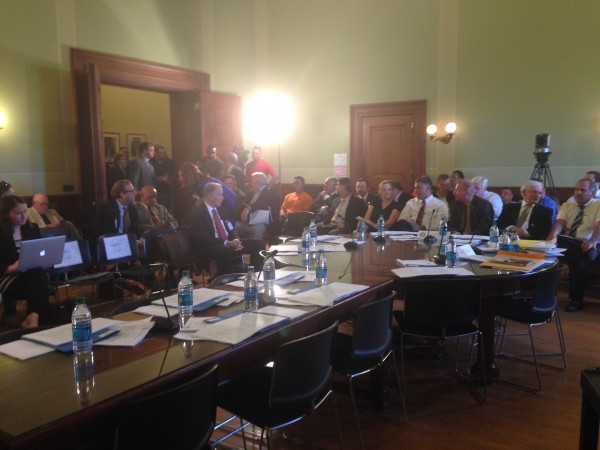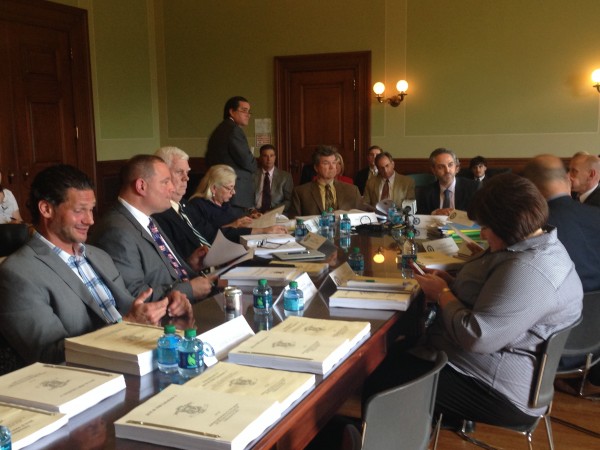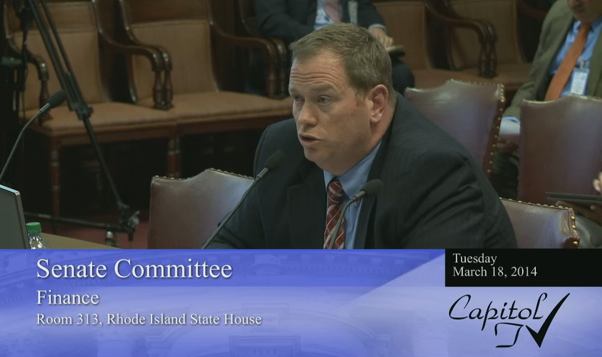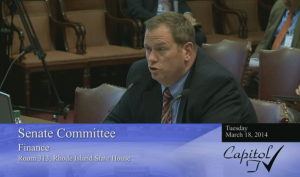
A Senate version of Governor Raimondo’s truck toll proposal, also known as Rhode Works, contains tax breaks for truckers.
The new version of the bill, sponsored by Sen. Dominick Ruggerio (D- District 4), and heard by the Finance Committee Thursday, includes $13.5 million in tax credits and rebates for truckers. They would receive tax credits on their registration fees, rebates on their gas and property taxes, as well as $3 million in grants for those who frequent TF Green Airport and Quonset Business Park.
RIDOT has also slightly reworked their funding formula for the proposal, asking for $500 million in revenue bonds, rather than $700 million. According to Director Peter Alviti, the difference would be bridged by refinancing some of the debt the Department already owes the state, which would give them another $120 million. Without that $80 million to complete the funding, Alviti said the Rhode Works program would be extended over a longer period of time, 30 years, to achieve the same goal. With this new schedule, RIDOT’s interest would increase, and they would eventually pay back $1 billion to the state. According to RIDOT, the total funding for the project would be over $4 billion.
The proposal is based on a serious need to repair Rhode Island’s bridge and road infrastructure, which is ranked 50th in the United States. During the hearing, Alviti stressed safety as one of the main reasons for Rhode Works’ existence.
“This is becoming a more frequent problem, and it will become more frequent in the days and weeks coming unless we do something now,” he said.
The program would also create 11,000 job years in the construction industry. RIDOT also anticipates $60 million each year in revenue from the proposed tolls, $38 million of which would be put towards fees owed to the state. Any other revenue from tolls would directly go towards the repair of bridges and roads. RIDOT plans to reconstruct 155 bridges using this money, as well as upkeep others that are currently in fair condition. The tolls would only charge tractor-trailers, costing them $.69 per mile in Rhode Island, while most other states in the northeast are $1 or more per mile.
“It’s understandable that there’s a certain amount of resistance to the changes we’re proposing. But it’s a fair cost,” Alviti said.
Jonathan Wormer, the director of the Office of Management and Budget, also gave testimony in support of Rhode Works, and explained how much these tolls will end up costing the trucking companies. There are 123 trucks that drive explicitly in Rhode Island all day, whose tolls would be capped at $60 for the whole day, costing the company just under $1.8 million. The 3,111 interstate trucks that come through the state would be capped at $30 per day, and cost $14.9 million. Such toll costs are only about two percent of what companies spend per year. Fuel is considerably more, at 39 percent.
These fees would be collected via EZ Pass, which many truckers that pass through the state already have. If they do not, RIDOT would also implement camera technology that would charge the owner of the license plate. Alviti stared during the hearing that they would not build any tollbooths that would hold up traffic. There are 17 possible locations that the department is looking to install these gantries.
Although most of this information has been revised from the previous bill, Christopher Maxwell, the President of the Rhode Island Trucking Association, said it’s still not ready to become law. “The debate and dialogue should continue, it should not end now. It should begin now that we have all the information,” he told Senate Finance members.
Maxwell believes that directly tolling tractor-trailers will violate the commerce clause in the United States Constitution, and discourage interstate commerce. He stated that no other state is exclusively tolling trucks.
“This does clearly put interstate commerce, and these carriers that you’re not giving breaks to, at a disadvantage,” he said. So much of a disadvantage, that Maxwell added that his association could provide legal proof that such a toll would violate the commerce clause.
“We want to be part of the solution, we are not part of this bill,” he added, citing that the association does have ideas on what RIDOT should do, but did not offer an explanation of what those ideas are at the hearing.
Local truckers came to speak out against the bill as well. Frank Nardone, one truck driver, explained that he avoids tolls in almost all of his routes, and Rhode Island would be no different.
“I don’t like to pay tolls, I don’t think they’re necessary,” Nardone said. According to Nardone, tolls are not the way to make money, especially because Rhode Island truckers already have to pay $388 for the road use tax.
“I think I’m being taxed enough,” he said.
Ed Alfredi owns a trucking company based in Smithfield, and in his testimony, said that Rhode Works makes it impossible to figure out exactly how much the tolls would cost his business.
“If I was to try and sit down, and see what this was going to cost me and my company, it’s very difficult, because there’s no facts,” he said. “It’s going to have an effect, and we should be able to have an exact figure of what these tolls are, where exactly they’re going to be.”
Time is of the essence for the governor’s proposal. While those opposed want more, those in support keep pressing forward, wanting to pass the legislation as quickly as possible. If their efforts fail, Speaker of the House Nicholas Mattiello has hinted at a special fall session in order to fully consider the bill.




